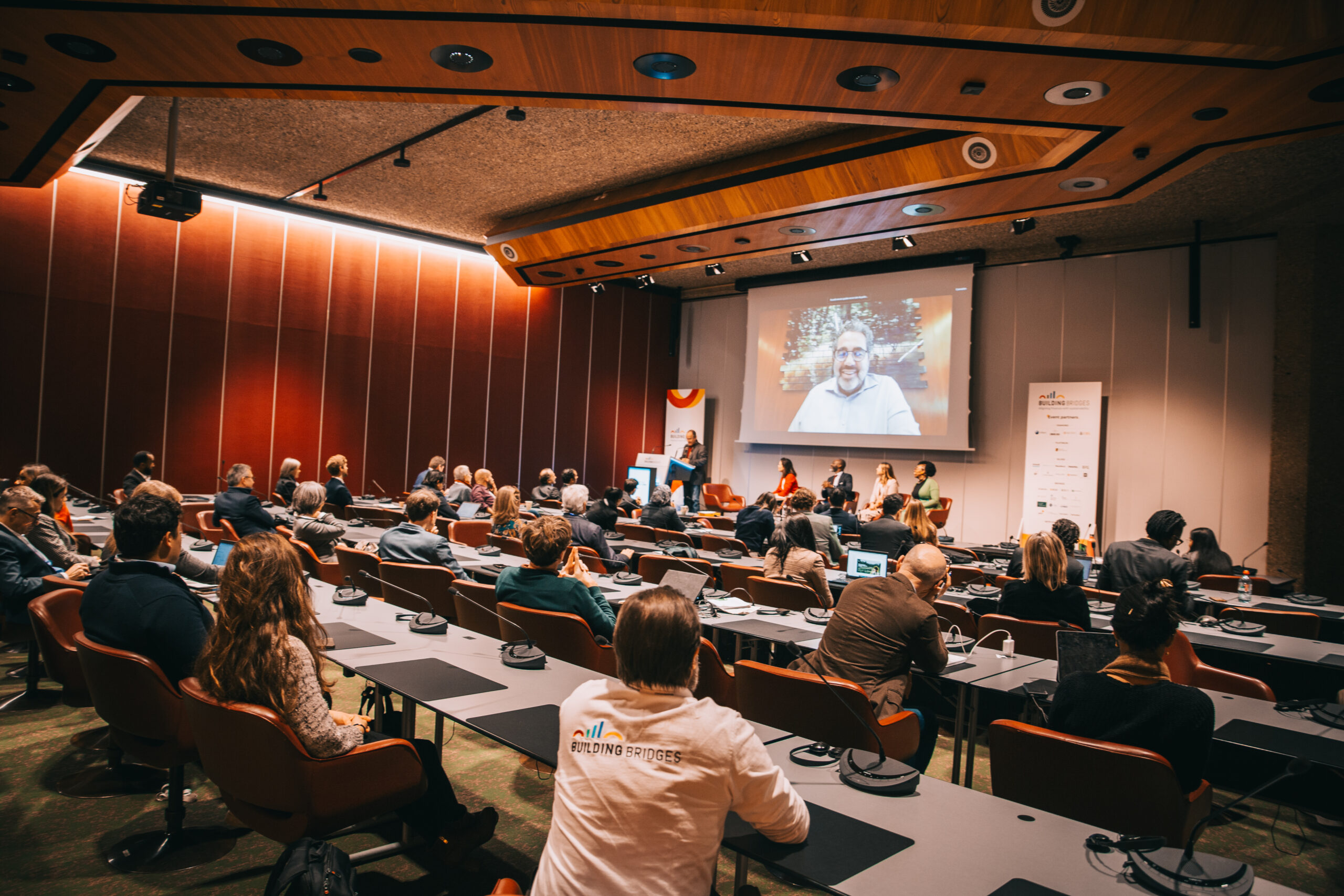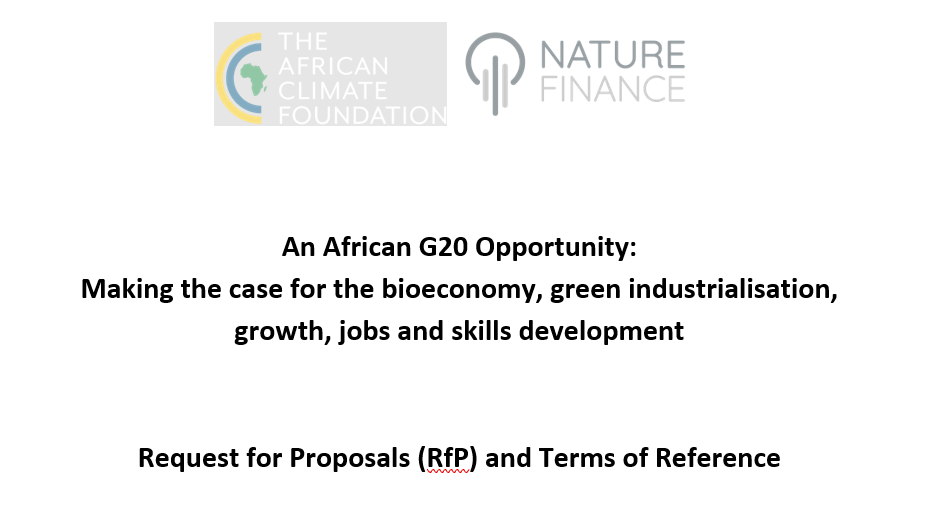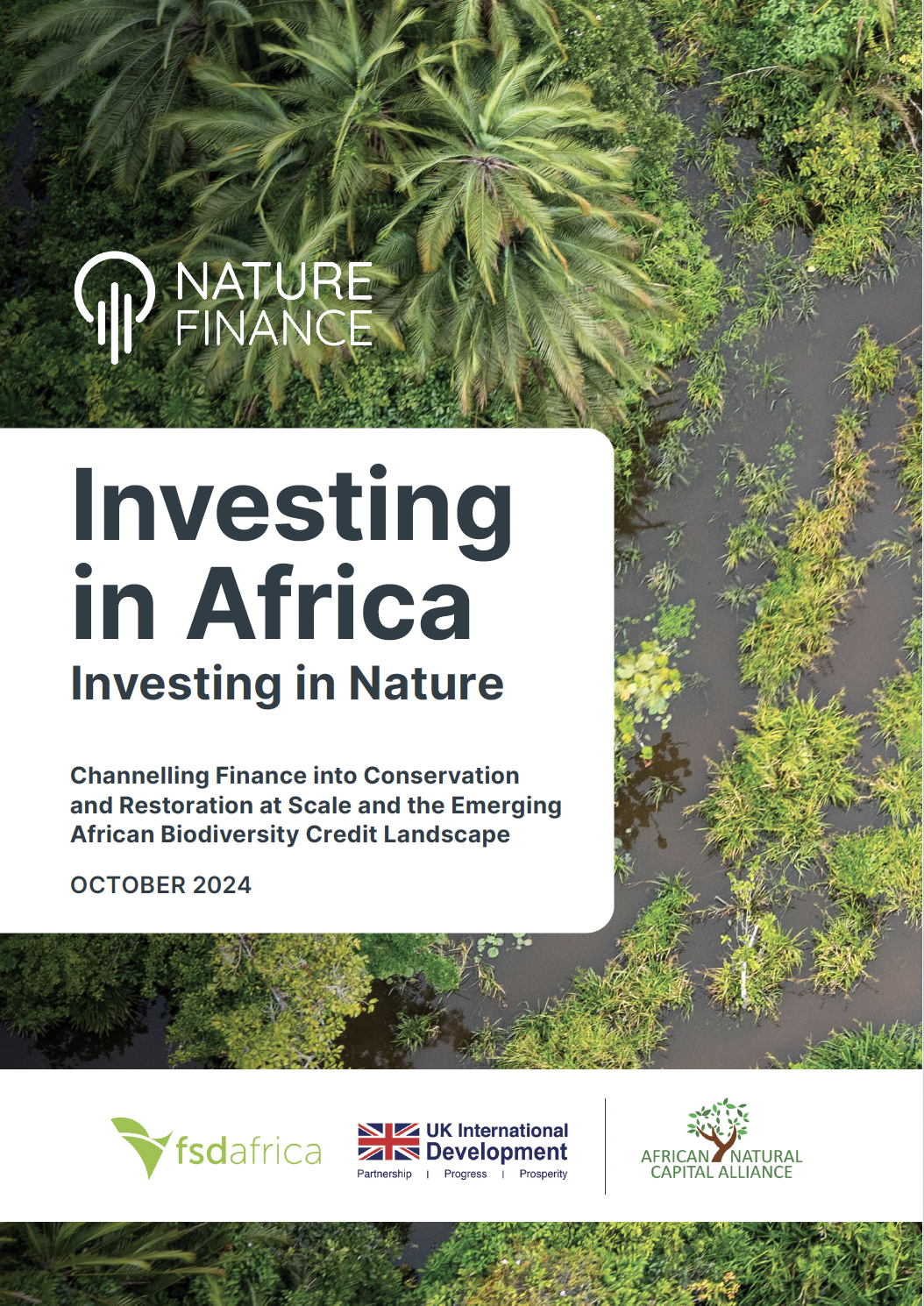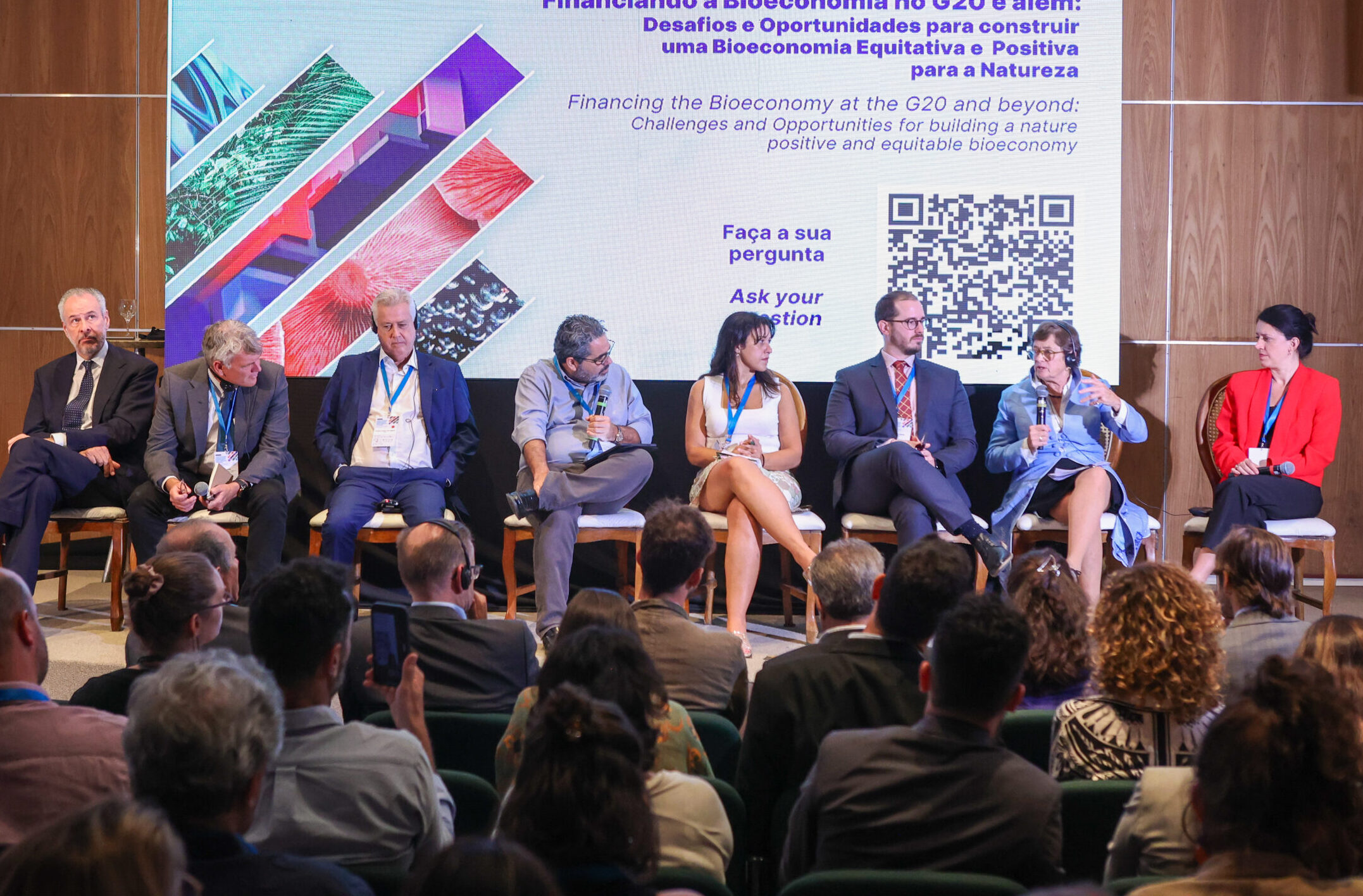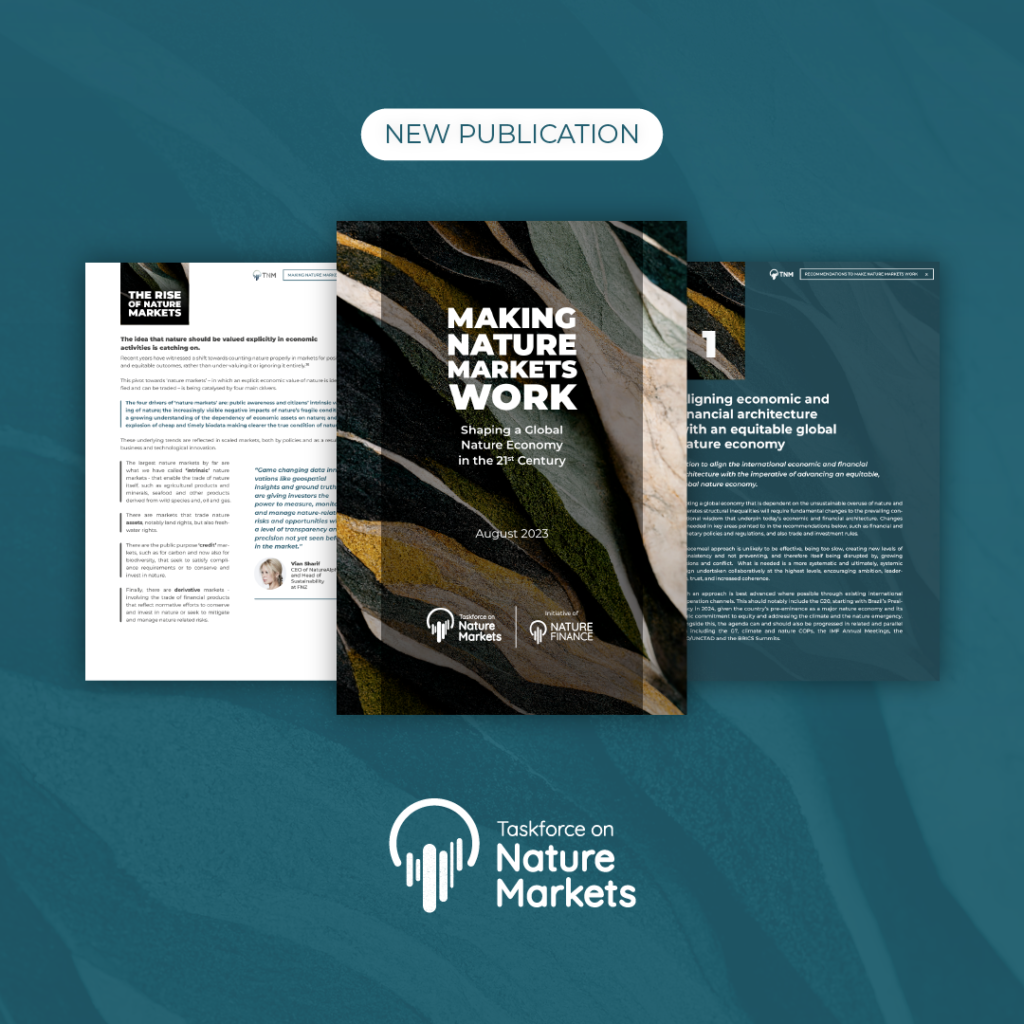
- The Taskforce on Nature Markets, an initiative of NatureFinance, has today launched its final landmark report setting out seven recommendations to embed nature and equity goals into global financial activity.
- Policymakers, central bankers and financial regulators are called on to put nature top of the agenda at influential global summits, such as the upcoming G20 and next G7.
- Reversing the historic extraction of under-priced nature from nature-rich countries and from Indigenous Peoples features as a top priority.
- Financing illegal markets and nature crimes is the most overlooked and vulnerable spot for investors, while soft commodity markets are the prime candidate for a governance upgrade.
10th August 2023, Belém Brazil – An unprecedented historic shift towards pricing nature in global markets must be harnessed to deliver on nature, climate, and equity goals, says a high-level group of policy, Indigenous, business, and financial leaders.
Today at the one-day finance side event to the Amazon Summit, the high-level Taskforce on Nature Markets launched its ‘Making Nature Markets Work’ recommendations report, detailing how the unprecedented shift towards pricing nature into the economy could make markets work more for people and the planet. The Taskforce called for more robust politically-backed governance frameworks to evolve alongside markets to prevent greenwashing.
The report’s ambitious yet practical recommendations for policy makers, market actors, and citizens include advancing traceability in the global food commodity markets, requiring traders to take nature and climate into account; ensuring carbon markets and emerging biodiversity credit markets deliver fair prices to nature rich countries, Indigenous Peoples, and local communities; and mandating nature crime-free value chains.
Beyond the alarming loss of biodiverse ecosystems, inadequate governance to halt the economy’s treatment of nature as a limitless, free resource has accelerated the climate crisis, intensified inequalities, and undermined both financial stability and food security.
The Taskforce forcefully argues that nature does not have the benefit of technology solutions which have supported clean energy action on combating climate change. Nature market transformation is reliant on policy incentives, regulation, and new governance frameworks at the local, regional, and international levels.
“Nature markets are a bridge to a total shift in our economic system”, said Sandrine Dixson, Chair of European Commission’s Economic & Societal Impacts Group and Member, Taskforce on Nature Markets.
“We can’t stop at placing a value on nature. A real transition requires not only financing change through low carbon and nature-based solutions, but changing our financial and economic systems to truly service people, planet, and prosperity at the same time”, she added.
The recommendations recognise that any solution to the nature crisis – policy or market-based – will not succeed without engaging nature’s stewards in formulating and executing effective solutions. In particular, Indigenous Peoples and local communities, who steward 80% of the natural world.
“It is fundamental that Indigenous Peoples are in the driving seat of designing and governing nature markets. Without nature there is no life on our planet nor a sustainable economy”, said Chief Almir Narayamoga Surui, Leader of The Paiter Surui People in Brazil and Member, Taskforce on Nature Markets.
The Taskforce’s seven recommendations are built on best practice, so while many are in motion, the report urges them to be accelerated in a way that catalyses change at a global scale with urgency and decisiveness.
1. Aligning economic and financial architecture with an equitable, global nature economy: align financial and monetary policies and regulations, and also trade and investment rules with the imperative of advancing an equitable, global nature economy.
2. Policy alignment of central banks and supervisors: require central banks to ensure that actions by financial actors, markets and systems are aligned with relevant government and international policy commitments on nature and climate.
3. Aligning public finance with the needs of an equitable, global nature economy: align public sector financial management with international nature commitments crystallised in the Global Biodiversity Framework.
4. Making food commodity markets accountable: as the world’s largest and most impactful nature market that facilitates the global trade of food, require policy makers and regulators to mandate full traceability and enhanced transparency about impacts.
5. Securing improved economic benefits for nature’s stewards: create coalitions composed of nature rich sovereign nations, Indigenous Peoples and local communities to deliver high integrity nature services at agreed prices.
6. Addressing the harmful impacts of nature crimes: reduce the incidence and impact of nature crimes – the third largest source of illegal financial flows – by establishing a requirement for investors and financiers to demonstrate a nature-crime free value chain.
7. Converging measures of the state of nature: create a universal agreement to measure the overall state of nature and ensure the data publicly available to avoid greenwashing.
The window to pivot the economy away from the unsustainable overuse of nature is shortening. While it will require radical changes to the way that businesses, markets and economies function, The Taskforce’s recommendations can deliver more equitable, nature positive markets that support the transition to a fairer, more sustainable economy.
“Changes that are urgently needed in financial and monetary policies and regulations, and also trade and investment rules, could be advanced by Brazil as a major nature economy, through to its G20 Presidency in 2024, and hosting COP30 in 2025” commented Marcelo Furtado, Principal, NatureFinance and co-lead of the secretariat, Taskforce on Nature Markets.
QUOTES FROM TASKFORCE MEMBERS:
“Although faced with divergent strategic interests, all countries need to commit to a more equitable, nature-positive global economy, including reshaped trade and investment policies, regulations and standards and rules governing public procurement and subsidies.” – Simon Zadek, Executive Director of NatureFinance, co-lead of the secretariat, Taskforce on Nature Markets.
“Accurately and consistently pricing the value of nature in economic decision making – with adequate governance – could incentivise more nature-positive markets, help mobilise billions of dollars to protect and restore nature, and fairly reward those on the frontline of stewarding it, including Indigenous Peoples and other local communities.” – Julie McCarthy, Managing Director, NatureFinance.
“We are entering into an era of political and legal battles of jurisdictions, with nature and climate as the centre of gravity, resulting in new forms of trade and protectionisms becoming viable again.” – Carlos Lopes, Professor, Mandela School of Public Governance & African Climate Foundation Advisory Council Chair.
“Game changing data innovations like geospatial insights and ground truthing are giving investors the power to measure, monitor and manage nature-related risks and opportunities with a level of transparency and precision not yet seen before in the market.” – Vian Sharif, CEO, NatureAlpha and Head of Sustainability, FNZ Group
“Earmarking funds for new environmental projects is not enough. Countries must also stop subsidising nature-harming industries and deploy national resources to support sustainable activity that can change the trajectory of the global economy.” – Carlos Manuel Rodríguez, CEO and Chairperson, Global Environment Facility.
“There is scope for markets to transform the way we reward both nature´s contribution to the economy, and nature’s stewards, including ways to clean nature value chains by engaging consumers and ensuring greater disclosure from producers, traders and investors.” – Joaquim Levy, Director for economic strategy and market relations, Banco Safra S.A
“Nature markets should have hard limits. Deep sea mining, for example, would be an environmental disaster and cause irreversible damage on a staggering scale, impacting marine life and carbon sequestration.”- Nakul Saran, Oceanographer
“Lessons we can apply from climate finance work to nature markets include the innovative uses of different types of capital to mobilise private finance and the need to collaborate to develop the frameworks, standards and even an accepted vocabulary.” – Rhian-Mari Thomas, CEO, Green Finance Institute
“Nature’s destruction presents profound risks to human societies and as with any serious risk we face, the rational response is to hedge – in the case of biodiversity loss this means taking a comprehensive, worldwide effort to appropriately value, protect, and restore nature.” – Hank Paulson, Chair, Paulson Institute
“Nature is our life-support system. If markets continue to neglect the consequences of short-term profit maximization on nature, the human journey on the planet will become much more perilous.” – André Hoffmann, Vice Chairman, Roche Holding
“Biodiversity credit markets can help ensure private sector financing is leveraged to protect and restore nature, as long as they are scaled for integrity, impact, and equity.” - Sylvie Lemmet, Ambassador for the Environment at the Ministry of Europe and Foreign Affairs
“An international nature markets governance framework would enable financial, scientific and government communities to work together on protecting marine and terrestrial health, climate resilience and food security for billions of people.” – Bruno Oberle, former Director General, International Union for Conservation of Nature
“As rule setters of the economic system, central banks and finance ministries need to promote putting a monetary value on nature – a critical step for nature to be included in key economic and financial decision making.” – Naoko Ishii, Executive Vice President, University of Tokyo, Director, Center for Global Commons
“Emerging technologies like blockchain, tokenization and smart contracts are the best in the toolkit for delivering on principle-based market design, so that in the future, taxpayers do not need to bail out private invested interests.”- Katrina Donaghy, CEO and Co-founder, Civic Ledger
ENDS
Media contact
Georgia Shortman, Senior Account Manager, Browning Environmental Communications: georgia@browningenvironmental.com
Simon Zadek and Marcelo Furtado, the two co-leads of the Taskforce are available for speaking opportunities.
Notes to Editors
About The Taskforce on Nature Markets:
The Taskforce on Nature Markets, guided by a leadership group that brings together a unique combination of perspectives and capabilities is an initiative of NatureFinance. Established in 2022, it aims to advance the potential and mitigate the risks of growing nature markets, with the aim of nudging their development in pursuit of more equitable, nature-positive outcomes.
The Taskforce has carried out its work at a pivotal moment, as the world takes more deliberate and ambitious actions to make nature count across the global economy and as the uncertainty over economic inequalities and injustice grows. The Taskforce’s findings and recommendations reflect this by highlighting the relevance for nature of both shifting geopolitics and a growing realisation that we are on the brink of global temperature rise well in excess of 1.5°C.
Full member information: https://www.naturemarkets.net/members
About NatureFinance:
NatureFinance is a Geneva-based, international non-profit organisation dedicated to placing nature positive and equitable outcomes at the heart of global finance. It focuses on reshaping sovereign debt markets, risk-related metrics, food system transition and anti-money laundering. Aiming to tackle climate change and reversing nature’s endangered state, NatureFinance works to better align global finance with nature conservation and restoration.
Key Statistics:
Nature-Economy nexus:
● World Bank estimates that our roughly US$8 trillion a year global food system negatively generates US$12 trillion annually in negative externalities, notably through destroying nature and contributing to global warming.
● According to a 2021 study, between 1960 – 2018, the Global North appropriated from the South a total of $62 trillion constant 2011 dollars, or $152 trillion 2 6 (in 2011 dollars) in commodities when accounting for lost growth. This extractive pattern has largely continued.
Nature loss:
● Global biodiversity has declined by 70% since 1970, according to the World Wild Fund for Nature’s authoritative Living Planet Index.
● The world has already lost a third of its forests.
● Hard commodities such as 90% of coal and 60% of oil and gas reserves should not be extracted in order to have a 50% chance of keeping global heating below 1.5°C.
Ecosystems value:
● Trees are estimated to reduce global warming by one third of a degree through the humidification of air. Oceans not only absorb around one quarter of global carbon emissions but also capture 90% of the excess heatgenerated by them.
● The world’s vegetation, from Amazonian rainforests to Eurasian grasslands, hold around 450 billion tonnes of carbon today, equal 50 years of what would be pumped into the atmosphere at current emissions rates.
Nature Markets:
● Nature credit markets, especially focused on carbon and emerging biodiversity credit markets, with a current combined annual value of less than US$5 billion.
● Illegal nature markets, covering the trading of the results of nature crimes, the third largest source of illegal financial flows estimated at up to US$1.5 trillion-2 trillion.
● Gains generated from ‘environmental crimes’, defined by the Financial Action Task Force (FATF), to include illegal mining, waste dumping and other offences, are estimated at around US$110 billion- to USD281 billion a year.
Indigenous peoples and local communities:
● Indigenous Peoples and local communities currently manage over a quarter of the world’s land surface, including many of the most biodiverse regions in the world.

